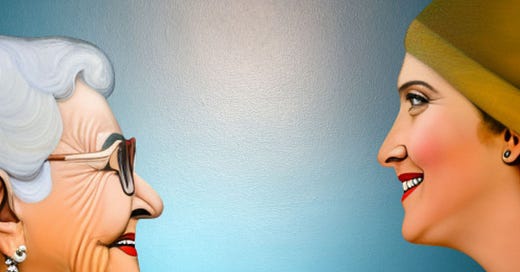I am excited! As I am sitting here at my desk, finalizing this week’s post, I just got an email announcing that today The Atlantic has also published a story about the gap between chronological and perceived age. I take it as a further confirmation of how important and relevant this topic is! So here is my take on the subject. Enjoy!
A couple of weeks ago, I took the bus to an acupuncture appointment. It was quite full, but I still got a seat. At one stop, an older woman with her adult son entered, and I stood up for the woman. Looking irritated, she shook her head toward me, turned around, and remained standing. Did I do something wrong, I wondered. Then I heard what she said to the son: “How old does she thinks I am?”
What did I think? Well, the woman had grey hair and some wrinkles, so I assumed she was probably around 60 or so. And then it hit me. I am almost 57. If somebody who is about my age vacated their seat for me, I would be irritated, too.
The reason why I got up is that I don’t feel like I am 57 at all. I feel more like I’m in my late 40s - sometimes even early 40s. It turns out my experience is not at all unique. Research shows that most adults feel significantly younger than they are.
In one study, William Chopik, Associate Professor at Michigan State University, and colleagues queried more than 250,000 internet respondents ranging in age from 10 to 89 about their age perceptions. They found that starting at around age 30, adults systematically felt younger than their chronological age. Forty-year-olds felt like they were in their mid-30s. Fifty-year-olds felt like they were around 40. Sixty-year-olds felt like they were 46. Seventy-year-olds felt like they were 53. Eighty-year-olds felt like they were 65.
“It looks like this is pretty consistent across age groups. People know that they are aging, but they are evaluating themselves and their lives and reporting feeling about 20 percent younger than their current age,” Chopik says.
The gap between chronological and perceived age even shows up when people are seriously ill. In a small study, L.F. Carver, a postdoctoral research fellow at Queen's University, Ontario, interviewed 66 older adults between 65 to 90 years old from the United States and Canada, all experiencing between two to six different illnesses, including cancers, heart disease and stroke, diabetes, kidney disease, arthritis, and thyroid diseases. Despite living with numerous illnesses, most of the people reported feeling decades younger inside than their chronological age. Specifically, the average perceived age was 51 years old which was an average difference of two decades between age inside and chronological age.
Of course, naked scientific data can only tell you so much. Aging and perceiving to age is a complex and highly subjective experience.
publishes , a wonderful Substack newsletter about “what it means to travel through time in a human body.” She asks “oldsters” of all ages to give their answers to a well-thought-out questionnaire about various aspects of the aging process. It is a treasure trove of eloquent and colorful accounts.Take Celeste Lecesne, a 68-year-old writer, actor, storyteller, and LBGTQ+ youth activist. To the question, “Do you feel old for your age? Young for your age? Just right? Are you in step with your peers?” he answers:
When I look around at my contemporaries, I'm aware that my generally positive outlook and my fierce determination to live a meaningful life in service to others is not the norm. And what was once perceived as naivety in my younger years I now consider a form of wisdom. This ability to be hopeful despite the evidence is something I've cultivated and espoused over the years; and I believe that it is the key ingredient allowing me to feel younger than my years.
Or the book author Gayle Brandeis who, at 54, remembers only a single moment in her life when she fully inhabited her age. She writes
I was walking to pick up my kids at summer camp. I was 30 at the time, and a voice inside me said “I am a 30-year-old woman” in a really commanding way, and I felt the truth of that in every cell of my body and it gave an extra oomph to my stride. The feeling only lasted a minute or two, but it left a deep impression; I loved that momentary full-body claiming of myself as a grown ass woman. Otherwise, I've always felt young for my age.
It is not as if everybody reports feeling younger. The novelist and performer Mike Albo, who is 53, says, “he feels ancient as the pyramids” or “at least infinitely wiser and more mature than I did even just 10 years ago”. Whereas the 65-year-old author and surfer Alice Kaltman, who “up until recently, felt perpetually like [she] was 18 years old,” now positions herself in the “just right” category - which “feels pretty fucking weird,” as she notes.
As for me, there are many days when I do feel my age in terms of body and cognition. For example, I can no longer work at awkward coffee shop tables without soon feeling terribly stiff. Also, doing math in my head doesn’t work as well as it used to, and in both English and German, words elude my memory more often than only five years ago. Feeling younger is more about a purling flow of new ideas and the constant desire to challenge myself. It is about having dreams, like moving to another country or exploring the world in a campervan - dreams I already had when I was 17.
Logo & Banner Design by Judy Higgins






